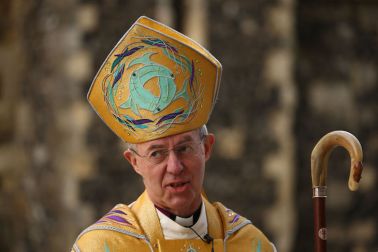The Tory green brigade now tends to be heavily concentrated in the House of Lords, where Zac Goldsmith recently joined John Gummer, now known as Lord Deben. This pair were jointly responsible for the Conservative party ‘Quality of Life’ report of summer 2007, which argued: ‘Beyond a certain point – a point which the UK reached some time ago – ever-increasing material gain can become not a gift but a burden.’
Had the hard-bitten Andy Coulson not arrived to reframe the Tory message, the party could well have gone into a general election in the autumn of that year with its central charge against Gordon Brown being that he had made the British people too well-off.
A lower-profile Tory environmentalist is Lord Duncan, a former MEP who resigned from the European parliament in 2017 to fight a winnable seat in Scotland but narrowly lost it amid the ‘Maybot’ meltdown. Fortunately for him, the soft red-leather benches of the upper chamber cushioned the blow.
Sunak would not have to do anything so crude as to abandon the Net Zero drive altogether
On Saturday, Duncan went on Radio 4’s Today programme to warn off those Conservative MPs who have drawn the lesson from the victorious Uxbridge by-election that the Tories should ease back on what David Cameron is once alleged to have described as ‘the green crap’.
Duncan spoke up for an ongoing ‘bipartisan approach’ between the big parties. It was this, he said, which had allowed the UK to be a world leader in reducing carbon emissions. When politicians talk of bipartisanship, they usually mean disarming the electorate. If both the incumbent and the main challenger have adopted the same position in a first-past-the-post system, then there is almost no way for the public to shift the dial. As Henry Ford might have put it: ‘You can have any colour so long as it’s green.’
Duncan was, in effect, telling elected colleagues for whom grubbing for votes is a regrettable fact of life, not to make the pace, scale and cost of Net Zero a dividing line with Labour. As the old joke about the bishop who came out for anti-disestablishmentarianism put it: ‘That’s easy for him to say.’
Because there are two lessons from Uxbridge and the other by-elections fought on Thursday that both point towards dialling down on the green agenda being a smart move. First, everyone agrees that in Boris Johnson’s old seat it was the Ulez extension plan of Sadiq Khan that determined the outcome. Secondly, across the three seats the key feature was not the opposition parties converting 2019 Tory voters, but huge chunks of those voters staying at home.
So the central challenge for the Conservatives is to motivate those electors to turn out for them again. Finding compelling dividing lines with Labour and the Lib Dems is key. On many issues where the Tories believe they could have a populist whip hand, Labour has responded by copying their policy to prevent any dividing line opening-up. One thinks of the overall public spending envelope or the two-child benefit cap.
There are promising signs for the Tories that their new Illegal Immigration Act could turn into an important battle line if only they can get the Rwanda plan up and running. But Keir Starmer’s tactic on that issue has been to seek to marginalise it, which his party has tolerated because fundamentally it believes that its own preferred approach to migration – open borders – is what is happening on the ground anyway.
That does not apply in the case of eliminating carbon emissions. On the contrary, the idea that the planet’s very viability is at stake has become an article of faith for most people on the Left. Alarmist coverage reinforcing that view is pumped out by almost every main broadcaster whenever there is a heatwave anywhere in the world.
Starmer would simply not be able to shadow any shift by the Conservatives away from the current punishing and hugely expensive pace of the Net Zero drive. The issue is so totemic for his own activists and MPs that they would go into meltdown. Ed Miliband would surely resign from the shadow cabinet. Hundreds of thousands of left-leaning voters would gravitate to the Green party on grounds that saving the planet was more important than getting traitor Starmer into power.
Yet up in the Red Wall, millions of practically-minded voters will have noted that the places where they live would be improved rather than undermined were it generally a bit warmer. Proposals to ban such voters in short order and at great expense and inconvenience, from having petrol cars or gas boilers will be very unpopular.
In judo there is an approach known as ‘soft technique’ in which a fighter uses the intensity and momentum of his opponent against him. Rishi Sunak has just such an opportunity as regards the green agenda. Starmer cannot soft-pedal on this. He must be seen by his tribe to charge at it.
Sunak would not have to do anything so crude as to abandon the Net Zero drive altogether. All he would need to do would be to extend time-frames and manage down short-term costs. He could, for instance, attack the Left for its ‘war on the motorist’ and adopt the EU timetable for banning the sale of new petrol and diesel cars rather than the UK one – 2035 instead of 2030. He could also start explicitly exempting swathes of unsuitable houses from any requirement to convert to ground-source heat pumps.
Lords Deben, Goldsmith and Duncan would not like this one bit. Perhaps they would even leave the party, which would serve as a helpful additional signal to the electorate that the Tories had changed tack, just as the departure of Brexit-blocking big names did in the run up to the 2019 election. The posh media would go berserk. Starmer would simply have to take the bait and accuse Sunak of murdering the planet. And the 2024 election would become another ‘establishment versus the people’ moment.
"soft" - Google News
July 23, 2023 at 02:19PM
https://ift.tt/MShjZqb
Going soft on Net Zero could save Rishi Sunak - The Spectator
"soft" - Google News
https://ift.tt/cbI1lAp
https://ift.tt/YQN38O0
Bagikan Berita Ini
















0 Response to "Going soft on Net Zero could save Rishi Sunak - The Spectator"
Post a Comment